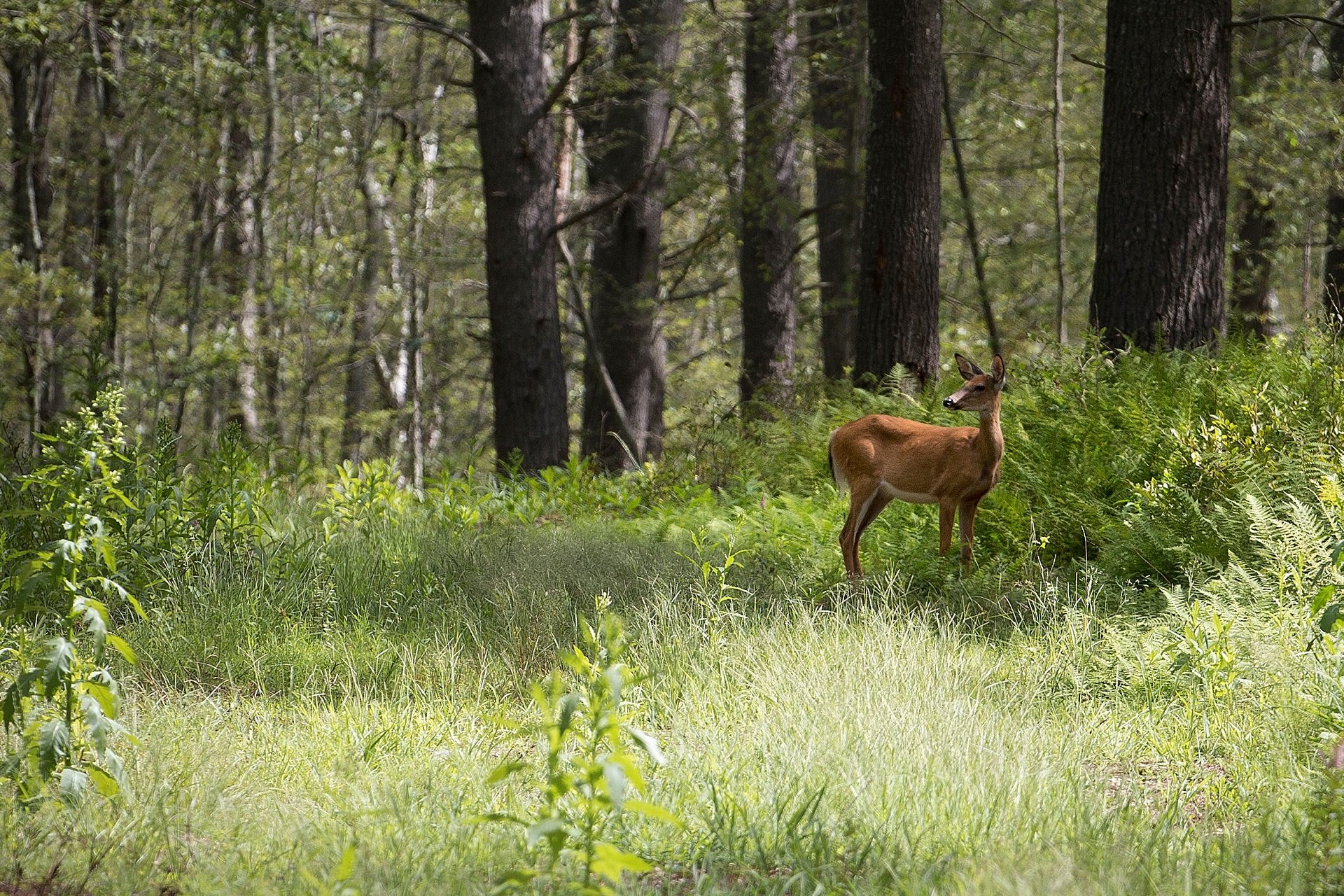Land Stewardship
White-Tailed Deer Management Plan
In some parts of Massachusetts, populations of White-tailed Deer have grown beyond their habitat's carrying capacity.
While Massachusetts forests can sustainably host 20 deer or less per square mile, field observations suggest there is 2-8 times that number at several Mass Audubon properties. At this density, the health of the ecosystem as a whole is negatively affected.
With more deer than their habitat can sustainably handle, we’re seeing:
- Reduced diversity of native plants and shrubs. Deer prefer to eat native species, making more room for invasive species to flourish.
- A loss of tree seedlings and saplings that would grow to be the next generation of canopy trees.
- Extreme thinning of shrub and groundcover, removing plants necessary for the survival of invertebrates, pollinators, and nesting birds.
We have concluded that a limited and carefully controlled hunting program with experienced, humane conservation partners is the only effective option to control their burgeoning population.
Nonpermitted recreational hunting on Mass Audubon properties is expressly forbidden. Only Mass Audubon-approved hunters are allowed to take part in our deer management program.
Frequently Asked Questions
White-tailed Deer were historically kept in check by large predators like mountain lions and wolves; however, with the reduction of these predators from New England, deer populations have grown unchecked. Coyotes will kill older deer and fawns but not nearly enough to keep numbers manageable.
In addition, suburbs have created a nearly-ideal setup for deer. They thrive on horticulture plants that lack thorns or bitter taste, set within well-situated grassy and wooded areas.
Teams of Mass Audubon scientists, researchers, and land managers reviewed published scientific research and spoke with private and public land managers to evaluate management options.
The use of contraceptives for wildlife management is currently not permitted in Massachusetts and does not reduce the number of deer in the near term, only slowing population growth with potential longer-term impacts on the total population. Erecting and maintaining fencing around our large properties, crisscrossed by trails and roads, would be financially exorbitant and essentially infeasible in practical terms.
We have concluded that a limited and carefully controlled hunting program with experienced, humane conservation partners is the only practical, feasible, and effective option.
A carefully managed hunting program initiated at Quabbin Reservoir watershed lands in 1991 reduced the deer population to the target range in 5 years. To reduce deer density from its current levels, we have set a goal of removing 20-25 deer per year at each enrolled sanctuary. Actual annual numbers will vary based on a range of factors. As of 2022, there are estimated to be 100,000 deer in Massachusetts.
Nonpermitted recreational hunting on Mass Audubon properties is expressly forbidden. Only Mass Audubon-approved hunters are allowed to take part in our deer management program.
Controlled hunting by pre-approved conservation partners occurs at:
- Moose Hill Wildlife Sanctuary, Sharon: Archery
- Ipswich River Wildlife Sanctuary, Topsfield: Archery
- Daniel Webster Wildlife Sanctuary, Marshfield: Archery; Shotgun; Primitive Firearms
- Allens Pond Wildlife Sanctuary, Dartmouth: Archery
- Broadmoor Wildlife Sanctuary, Natick: Archery
- Sesechacha Heathlands Wildlife Sanctuary, Nantucket: Archery; Shotgun; Primitive Firearms
- Waseeka Wildlife Sanctuary, Hopkinton: Archery
- Nashoba Brook Wildlife Sanctuary, Westford: Archery
- Brewster's Woods Wildlife Sanctuary, Concord: Archery
- Cedar Pond Wildlife Sanctuary, Wenham: Archery
- Elm Hill Wildlife Sanctuary, Brookfield/North Brookfield: Archery
- Broad Hill Wildlife Sanctuary, Holliston: Archery
- Arcadia Wildlife Sanctuary, Easthampton/Northampton: Archery
Hunting does not take place at any other Mass Audubon wildlife sanctuaries if not listed above.
During the hunting season, approved hunters are allowed from 1/2 hour before sunrise to 1/2 hour after sunset. By state law, hunting is not permitted on Sundays.
We have carefully established designated hunting zones based on their ample distance from roads, buildings, and trails. Most hunting occurs from tree stands.
Because the issue of deer overpopulation is being seen throughout the state, several other conservation groups permit hunting on some of their properties. The list includes The Trustees of Reservations, Wildlands Trust, Sudbury Valley Trustees, Essex County Greenbelt Association, New England Forestry Foundation, Mount Grace Land Trust, Berkshire Natural Resources Trust, Opacum Land Trust, and all of the major conservation land owners on Nantucket.
In most of Massachusetts, venison can only be consumed by the hunter and their friends and family. We’re currently working with public health offices to explore opportunities to direct meat to food banks, homeless shelters, and soup kitchens.
The selected hunters are licensed, have passed background checks, and are trusted conservation partners of Mass Audubon. Each of our invited hunters has passed a proficiency test to prove their ability to accurately place a humane shot.
Our program is very limited in scope, so we are not accepting applications at this time.
Reducing Lyme disease incidence is not the primary goal of this program. While some studies suggest that reducing deer density contributes to reduced tick density and lower Lyme incidence, other studies are contradictory. Our main motivation is to reduce damage to woody and herbaceous plants caused by deer browsing.
Last updated 10/3/2024



